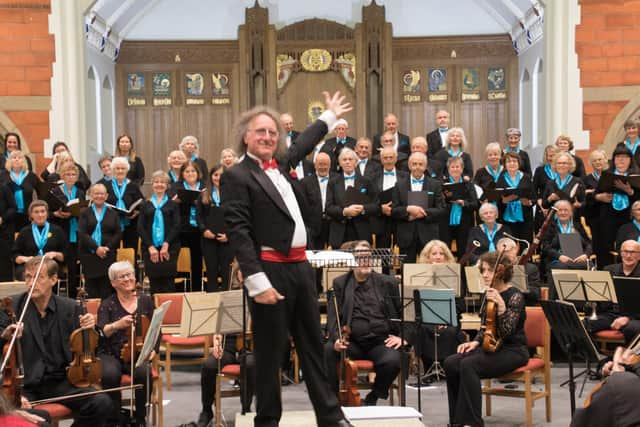Burgess Hill Choral Society review - A concert full of heart and poignancy
and live on Freeview channel 276
Burgess Hill Choral Society’s Requiem concert was a fitting tribute to the continuing struggles of the people of Ukraine. The evening also acknowledged the long service and dedication of John Morgan to the group. The choir sang with commitment and displayed a high level of preparation which excellently complimented the high calibre of the soloists all currently studying at The Royal Academy of Music.
The first half of the concert was a selection of choruses from Karl Jenkin’s Requiem. This popular and musically eclectic Welsh composer engages the listener with his use of repetition and filmic style. The highlight of the extracts chosen was the Dies Irae. The impactful opening, led by the excellent percussion section, catapulted the choir and orchestra into a high energy movement with sustained concentration and rhythmic drive. Another standout moment of the Jenkins was a beautifully sung acapella section in the Rex Tremendae, based on a Gregorian melody, where the choir found a good balance and plenty of soul. The clarity of tone and calming manner of the soprano soloist, Isla MacEwan, beautifully reflected the poignant text of the Pie Jesu: Pious Lord Jesus, Give them rest, Pious Lord Jesus, Give them everlasting rest.
Advertisement
Hide AdAdvertisement
Hide AdThe Sussex Mozart Players led by Richard Sutcliffe provided solid support for the Mozart Requiem in the second half of the evening. Again, a high energy Dies Irae stood out among the movements. The large audience were treated to soloists of distinction. All in the final stages of study with much experience to date, their singing displayed elegant phrasing, exceptional quality of tone and tender sensitivity, whether singing as an ensemble or individually. The resonant Will Pate did not disappoint with the famous opening of “Tuba mirum spargens sonum”, Bernadette Johns had a highly impressive even tone which was superbly projected in the lower range and tenor, Samuel Kibble, displayed an engaging dynamism without being over dramatic. The haunting sound of the wind in the St Andrew’s rafters was a disarming moment breaking the silence before the Lacrymosa, only adding to the pathos. Conductor, Michael Stefan Wood, guided soprano, choir and orchestra particularly attentively through the last movement as he had done for the whole evening. It was expertly managed, especially the entries for “Cum sanctis tuis“ and brought a highly satisfying evening to its conclusion.


Have you read: The Taxidermist's Daughter: This is the verdict of the arts critics of the national press
Have you read: Petworth Festival: This is when it is being held, here are the names of those appearing, and this is how to obtain tickets
Have you read: Hastings panto announced
Have you read: Exploring the great joys of the South Downs Way
Advertisement
Hide AdAdvertisement
Hide Ad